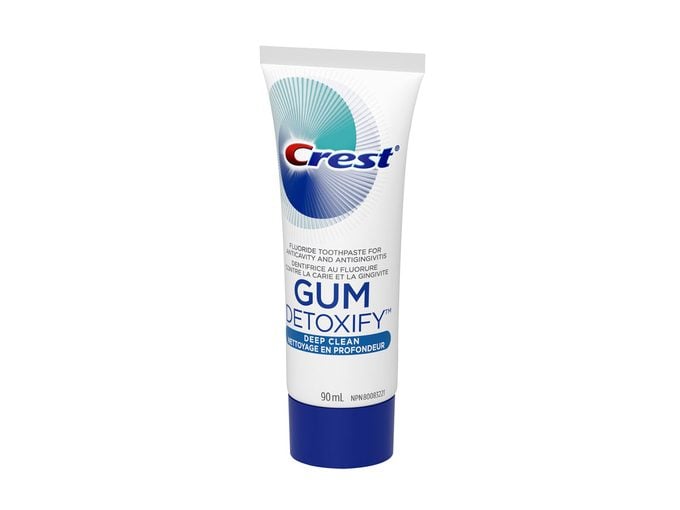Why You Need To Start Taking Your Gum Health More Seriously
Experts advice on the silent signs you need to recognize and how to prevent against gum disease.

“Did you brush and floss your teeth?,” my mom (a dental hygienist at the time) would ask me every morning before school and every night before I would hit the sheets growing up. As long as I was under her roof, she was determined to keep my teeth cavity-free and my gums as healthy as they could be. And still, to this day, I think of that reminder she has ingrained in my noggin during my morning and nightly routine.
But having braces during my teenage years (not once, but twice), left me with a lingual wire that is bonded to the inside of my front six bottom teeth to keep them from shifting. This appliance makes it next-to-impossible to clean my gums properly, causing bacteria and plaque to build up. The result: red and inflamed gums that often bleed, which if left untreated can lead to gingivitis, an early stage of gum disease.
According to Crest, approximately 78 percent of adults over the age of 30 will suffer from some form of gum disease. This shows, that as Canadians, we need to start taking our gum health more seriously. So, to better understand gum disease and how to prevent it, I sat down with Dr. Jason Adinata, a dental professional and Crest Smile Council Member along with Crest’s research and development specialist, Amy Hamilton.
But first, the early signs to watch for.
It’s important to recognize the early signs of gum disease. Dr. Adinata identifies redness, bleeding and swelling of the gums to be the main culprits to watch out for. (Don’t miss these 6 reasons why your gums are bleeding.) “You really want to treat gingivitis at its earliest stages, because when you don’t, you get chronic prolonged gum disease (known as periodontal disease) that ends up causing permanent damage to the gum and bone structures that surround the teeth,” he says. Once you have a chronic infection, expensive and time-consuming procedures become your only option of treatment, depending on the severity.
The hardest sign to detect.
Periodontal pockets (which are the spaces along the gum line that surround the teeth) are the hardest sign to detect, according to Dr. Adinata. And since there’s no way of measuring your pockets at home, an in-office assessment and exam is necessary. “This is the only way for us to clinically detect the response of your body to the irritants and inflammation,” he says. “If we’re actually seeing pocket formation or attachment loss (of three- to six-millimeters), that’s indicating to us that there is some sort of inflammatory process happening.”
It’s also important to keep in mind that gum disease doesn’t just happen overnight. It’s not like today you’ll have light pink gums and tomorrow they’re puffy, red and bleeding. “Think of it as more of a gradual progression,” says Hamilton. And because of this, people aren’t always sure whether or not they have gingivitis.
If gingivitis goes untreated, health complications arise.
“We definitely know that there is an oral, systemic connection,” says Dr. Adinata. For those who have gum disease, there is a strong link between it and cardiovascular disease such as heart disease, stroke and diabetes. Just as there is a link between the inflammation in your mouth and other inflammatory diseases that can occur in the rest of the body. “If your body has this constant bacteria that’s affecting your gums, your body immune and inflammatory response is on overdrive constantly working to kill the bacteria,” he says. “This response can start to affect other inflammatory diseases, like rheumatoid arthritis.” Here are 15 serious diseases occur more in women than men.
Gum disease can even have an effect on a woman’s pregnancy, due to there being a big spike in hormones. “They can have premature or even low-weight babies,”says Dr. Adinata, referring to it as “pregnancy gingivitis.” It becomes hard for women to put a toothbrush in their mouth to take care of their oral hygiene when they’re in that state because they just feel like gagging, he says.
And if there’s one thing he wants his patients to take seriously, that would be this association between the mouth and the rest of the body. “I always tell patients: ‘Your mouth is way closer to the most important thing in your body, which is your brain. Shouldn’t you be concerned about that?’”
How to get rid of gingivitis.
It all comes back to oral health: brushing and flossing your teeth. “If you’re not doing that, it will definitely increase the plaque levels in the mouth, and that bacteria itself ends up producing the toxins that cause inflammation,” says Dr. Adinata. Appliances like lingual wires and braces also trap bacteria and plaque, making it difficult to clean and manoeuvre around. He suggests using the Oral-B Genius 8000 electric toothbrush to get in those nooks and crannies to clean all of the plaque and bacteria from the teeth. (Find out how to banish bad breath for good with these helpful home remedies.)
At the end of the day gingivitis is reversible, but it’s important to remember that prevention itself is the key to maintaining healthy gums. Enter new Crest Gum Detoxify Toothpaste which is specifically for gum health. Its detoxifying formula is designed to penetrate as deep as four-millimetres below the gum line to help stop the growth of harmful plaque bacteria, which the enhanced foaming action helps seek out bacteria in hard to reach places. As for its secret for penetrating the gum line? Stannous Fluoride. This type of fluoride really is the main ingredient for actually allowing the toothpaste to reach below the gum line and neutralizing harmful bacteria and toxins, says Hamilton.
According to Crest, 99 percent of gingivitis patients who used this toothpaste during clinical studies showed reduced gum bleeding and inflammation after eight weeks of use. I’ve been using this toothpaste for one month so far, but already I’ve noticed a significant change: the bleeding that had been occurring on my lower gum line where my lingual wire sits has stopped. Can you blame me for being curious to see what another month will do?
By the way, with Halloween just around the corner, check out the worst candy for your teeth.
Crest Gum Detoxify Toothpaste, $6.50 at mass retailers.





